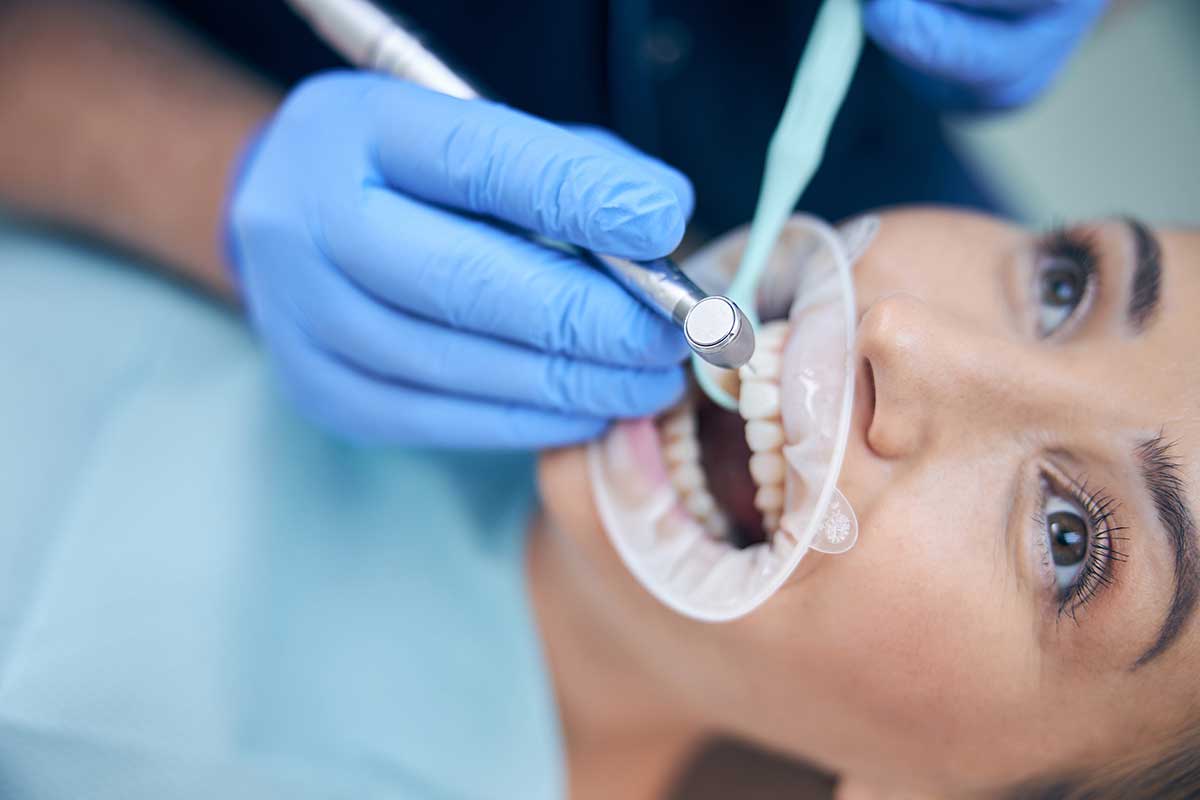Oral Health Risk Estimator
Dental health is crucial for our well-being – both physically and mentally. Unfortunately, it’s often ignored until pain strikes. To help you better understand issues that frequently arise, we’ve created this article exploring the most common dental issues we see at our Hamilton dental clinic. We discuss symptoms, causes, and prevention methods, covering conditions from tooth decay to sensitivity. This information can help you evaluate your risk and protect your oral health and smile.
Table of Contents
What is oral health?

The Canadian Dental Hygienists Association of Canada (CDHA) defines oral health as “the state of the mouth and associated structures being free from disease and, where future disease is inhibited, maintaining functions such as eating, talking, and smiling, contributing to overall health, well-being and quality of life.”
Why is oral health so important?
Keeping your mouth and body free of oral disease is one of the most important things you can do for your overall health. That said, oral diseases are one of the top chronic conditions in the country and include problems like tooth decay and gum disease. Oral diseases are associated with other conditions, such as diabetes and cardiovascular and respiratory diseases.
Oral disease affects more than just health; it can also impact learning, socializing, and working. Missing days at work or school because you’re at the dentist or at home feeling bad isn’t good. Neither is fighting with low self-confidence because your smile doesn’t look how you want it to, or you are having trouble speaking or eating.
The bottom line is that you can’t enjoy an all-around healthy lifestyle without caring for your oral health.
General risk factors for oral health issues

Oral health problems and concerns have various risk factors. The factors included in the following list can raise the chances of dental diseases and conditions. Our aim at Martindale Dental is to help educate our patients on the following risk factors that increase the chances of dental diseases and conditions to reduce the number of oral health complications our patients face.
Poor oral hygiene: Not brushing and flossing enough causes dental plaque buildup. This leads to tooth decay and gum disease.
Diet: Eating lots of sugary and acidic foods erodes tooth enamel. This can cause tooth decay. Sticky or chewy foods that stick to teeth increase cavity risk.
Tobacco use: Smoking or using tobacco products raises gum disease risk. It also increases the chance of tooth loss and oral cancers. Healing after dental procedures can be affected, too.
Alcohol consumption: Drinking too much alcohol increases oral cancer risk. It can also lead to more gum disease.
Age: Certain age groups, like children and seniors, face specific dental issues. Kids are prone to cavities, while older adults may deal with gum disease, tooth loss, and oral cancer.
Socioeconomic status: People with lower incomes have a higher risk of oral health problems. Limited access to dental care, lack of oral hygiene education, and poor diet can contribute.
Lack of professional dental care: Not getting regular dental check-ups allows oral health issues to worsen without treatment.
Medical conditions: Diseases like diabetes can raise gum disease risk. Medications that reduce saliva flow can also increase the likelihood of tooth decay.
Genetic susceptibility: Genetics can influence how prone someone is to cavities, gum disease, and oral cancers.
Environmental factors: Fluoride exposure, often from water or dental products, helps prevent tooth decay. Lack of fluoride exposure can increase the risk of dental problems.
The most common dental issues faced by our patients

Tooth Decay (dental caries)
This is the most prevalent dental problem in Canada and around the globe, affecting people of all ages. It occurs when bacteria in the mouth convert sugars from food and drinks into acids that erode tooth enamel and let decay begin. Patients of all ages are susceptible to cavities. While an isolated cavity isn’t a big deal if treated promptly, chronic tooth decay can point to an underlying problem and cause larger issues, such as tooth and bone loss in the future.
Prevention:
In general, preventing tooth decay and cavities means following these simple steps. Brush twice daily, floss every day, and keep up with dental check-ups. Avoid sugary, acidic foods; drink lots of water and use a mild mouthwash. These habits reduce decay risk and promote dental health.
Gum disease (periodontal disease)
Starting as gingivitis before advancing to periodontitis, gum disease is prevalent among Canadian adults and is a leading cause of tooth loss. Improper and infrequent oral hygiene practices are the main culprits, while not visiting a dentist for professional cleanings, thus allowing plaque and tarter to build up is a close second.
Prevention:
Forgive us for sounding like a broken record, but stopping the onset of gum disease means a proper oral hygiene routine consisting of brushing twice daily, rinsing, flossing and paying special attention to the areas between teeth and along the gumline. Regular dental visits for check-ups and cleanings are also a vital component of steering clear of gum disease.
Tooth erosion
Usually caused by acid attacking the enamel, tooth erosion can result from dietary acids, acid reflux, medications, or other conditions. The loss of tooth enamel leads to tooth sensitivity and other uncomfortable issues. Enamel loss also occurs from teeth clenching or grinding (bruxism), chewing hard objects, and using excessive force when brushing teeth.
Prevention:
To prevent tooth erosion, limit acidic foods and drinks. Use a straw to reduce contact with teeth. Don’t brush right after consuming acidic substances; wait 30 minutes. Opt for a soft toothbrush and fluoride toothpaste, and consider an alkaline mouthwash to neutralize acidity. Schedule regular dental check-ups for enamel health and use a nightguard if you’re prone to clenching or grinding your teeth.
Tooth sensitivity
Many, if not most, people experience some discomfort or pain in their teeth when exposed to hot, cold, sweet, or acidic foods and drinks. The most common cause is worn enamel or gum recession that leaves the roots exposed. While tooth sensitivity toothpastes can help, severe cases may require dental veneers, crowns, or even implants to address the tooth pain.
Prevention:
Unfortunately, it can be difficult to avoid tooth sensitivity altogether. This is because tooth enamel wears down with use, inevitably leaving teeth exposed. Preventing enamel loss means stopping grinding, clenching, and hard brushing. It also helps to reduce the intake of acidic or sugary food and drinks or at least give your mouth a good rinse afterwards.
Oral cancers and lesions
While less common than cavities or gum disease, oral cancers are significant health concerns affecting the lips, tongue, cheeks, and throat, necessitating early detection and treatment.
Prevention:
The best way to prevent oral cancers and lesions is to live a healthy lifestyle, avoiding smoking and heavy alcohol consumption. If not preventable, early detection is vital, and visiting your dentist for regular checkups is crucial to a favourable outcome.
Toothaches and dental emergencies
Acute pain and dental emergencies, often resulting from untreated decay or injuries, are prevalent issues that prompt urgent dental visits. It’s often the case that patients don’t visit a dentist until they have some pain or discomfort, which can mean visiting an emergency dentist during off hours.
Prevention:
While tooth pain can happen for many reasons, including accidental injury, the best way to steer clear of preventable tooth pain is to keep up to date with regular dental visits so that any potential problems can be corrected before they happen.
Bad breath (Halitosis)
Often linked to deeper dental issues like decay, gum disease, or oral infections, bad breath is a common concern that affects social interactions and oral health. It can also be linked to certain issues, such as dry mouth and medications for other medical conditions.
Prevention:
The best method for preventing bad breath is a good oral hygiene routine (brushing, flossing, rinsing) and dental cleanings at your dentist’s office.
Wisdom tooth issues
Problems related to wisdom teeth, such as impaction or misalignment, are common among young adults and often require surgical intervention. Our general estimate is that 65% to 70% of our patients have their wisdom teeth removed at some point in their lives.
Prevention:
There really isn’t a preventative method to prevent wisdom teeth from needing to be extracted. It mostly comes down to how the teeth are formed, whether they erupt and whether they impede the surrounding teeth. If wisdom teeth have erupted properly and are straight (not impeding or crowding other teeth), then removal may not be required.
Orthodontic issues
Misaligned or crowded teeth, overbites, and underbites are widespread concerns that affect dental function and aesthetics, with many Canadians seeking orthodontic treatment.
Prevention:
More so than prevention, early detection and management of orthodontic issues mean that teeth and jaws are realigned before they get too out of line. Orthodontics are generally used as children and teens age, although adults are also great candidates.
Teeth grinding (Bruxism)
Bruxism can occur for several reasons, including stress, anxiety, sleep disorders, and abnormal bite structure. It can also cause headaches, jaw and muscle soreness, and tooth damage such as excessive wear (tooth sensitivity), chipping, and cracking.
Prevention:
In many cases, patients grind their teeth while they sleep and don’t realize they’re doing it. Preventing bruxism means addressing the root cause of the issues, be that mental (stress and anxiety) or physical (abnormal bite). The best option is to wear a bite guard while sleeping to reduce tooth damage and wear.
Missing teeth
Missing teeth can result from decay, disease, or injury. They can cause problems with chewing, speech, and tooth alignment and even affect facial appearance and self-confidence. Treatments like implants, bridges, or dentures address these issues. Dental implants, especially, offer long-lasting, natural results.
Prevention:
A thorough oral hygiene routine (brushing, flossing, rinsing) is the best method of preventing tooth loss due to tooth decay. Wearing a mouthguard during sporting activities can help protect against injuring your teeth.
Preventative oral health care from Martindale Dental

Oral health care is our main concern at Martindale Dental, and our dentists focus on preventing issues before they happen. We have clinic locations in St. Catharines, Hamilton and Cambridge that all accept new patients and walk-ins alongside our long-standing and valued regular patients. Apart from Martindale Dental clinics, Hamilton, ON has many other options for dental care.
While we understand that taking good care of your oral health requires time and some effort, the issues that could arise without it are far worse. When it comes to oral health, prevention is better than treatment.
Conclusion
As dental healthcare professionals, we see the same common dental issues repeatedly. Many issues could be prevented by maximizing oral health care and dental checkups, which is why we educate our patients on what’s required of them. It’s not worth going through the pain, hassle, and added expense of treating dental issues when a simple hygiene routine and frequent professional cleanings could have prevented the problem.
There are no dumb questions about your oral health, so if you are unsure about something, please ask. Our offices always accept new patients and welcome every smile that comes through our door. Booking an appointment at a clinic location that’s convenient for you is easy—simply click the contact us link at the bottom of this page to get in touch.
Check us out on Facebook and Twitter for daily information about Oral Health from Martindale Dental, or visit our offices in Cambridge, Hamilton, and St. Catharines.
Have more questions?
Please contact us for all inquiries or to book an appointment with one of our convenient clinic locations. We look forward to hearing from you.




